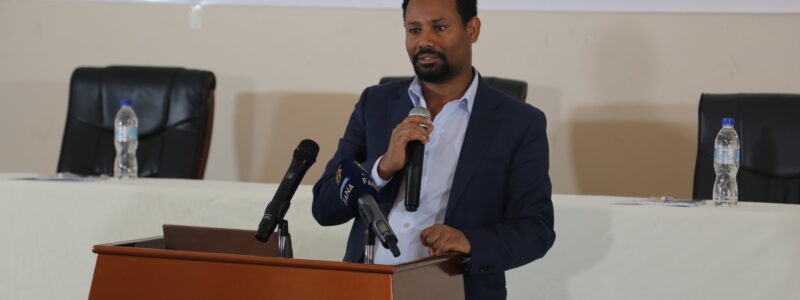The TB Commitment Grant, a fixed amount sub award issued through JSI under the United States Agency for International Development (USAID) Tuberculosis Implementation Framework Agreement (TIFA), and implemented by Armauer Hansen Research Institute (AHRI), with an oversight from TRAC and NTP has successfully completed its objectives. Dr. Yewulsew Kassie, Senior Infectious Disease Advisor at USAID/Ethiopia Health Office, shares insights on the grant.
Q. What motivated USAID to support capacity building on evidence generation, data use and other initiatives of the TB program?
Dr.Yewulsew: The US Government is committed to provide support to the government and people of Ethiopia to address health issues and particularly infectious diseases that affect the health and lives of millions of Ethiopians. TB is a leading cause of mortality, claiming more lives than HIV and Malaria combined.
Despite being one of the biggest public health problems, TB program is underfunded with nearly 70 percent funding gap to fully implement proven scientific interventions and to make it works. Close to 50 percent of families/households affected by TB faces catastrophic cost. With the limited resources and the disease being the leading infectious killer, USAID is determined to implement and support high impact, cost-effective and evidence-based strategies/interventions. That can only be realized with a home-grown capacity to generate evidence with the engagement of all stakeholders like the academia, public health program, the private sector, and local organizations. The TIFA grant was dedicated to build the capacity of programmers, researchers, and academia to continuously generate evidence and inform the ministry of health for policy and program improvement.
The biggest motivation being to have a home-grown research capacity that will continuously inform the ministry of health with evidence, USAID is also committed to respond to the UN high level declaration in September 2018 and 2023. Our 120 years of strong partnership between the US government and the people and government of Ethiopia is a seed and big motivation for us to continue responding to the MOH’s effort to ending diseases of public health concern, and TB is one of the great priorities of USAID.
Q. How will the project aid in the fight against tuberculosis in Ethiopia?
Dr.Yewulsew: The TIFA grant will help the MOH’s effort to end TB by producing evidence and approaches that will inform the program to improve its performance. Despite we totally adapt global evidence and guidance, this initiative has built the capacity of 12-14 research teams to continuously work on identified research agendas of the ministry of health. In addition, this training built the capacity of national TB program to early adapt, contextualize and implement/rollout global evidence and guidance. Furthermore, the TIFA project will leave a big homegrown capacity and capability that will continue to research public health problems beyond TB.
Q. What suggestions do you have regarding the uptake of research findings?
Dr.Yewulsew: The transformation of TRAC beyond research dissemination during the annual conference is very highly required and too late for such a structure to expand its role to analyze, do meta-analysis, and develop policy /program briefers to augment annual TB programming with local and international evidence. TRAC must also consider either bi-annual or annual analysis of global developments and provide technical input/guidance to the Ministry’s TB program and other stakeholders to continue timely adapting and rolling out of latest global evidence, tools, and initiatives. In addition, the annual TB conference shall plan to present a meta-analysis of research outputs and inform annual planning/programming.
Q. How would you describe the contribution of USAID’s key activities, including this grant, to combating TB in Ethiopia?
Dr.Yewulsew: The USAID Activities/Projects are the major supporters and partners of the TB program in Ethiopia. USAID activities has continued to provide unwavering support to TRAC, MOH, and other government institutions to combat TB and DR-TB. As an example, USAID has expanded the roll out of cutting-edge TB diagnostic tools and its contribution exceeded 59% of the whole of the current national status and USAID project’s insured the capacity building of all the health work force cadres to early detect, treat, and prevent TB/DR-TB. USAID has played a key and indispensable role in the reduction of the magnitude of MDR-TB in Ethiopia by rolling out ambulatory model of care and expansion of DR-TB treatment facilities to more than 67 including renovation of more than 20 MDR-TB facilities and roll out of shorter treatment regiments including free donation of newest drugs.
All USAID Activities/Projects have played a great role in developing, implementing, and evaluation of initiatives /innovative ideas including but not limited to expansion of Public-private mix, design and rollout of community TB care, high load TB facility initiative, development and roll out of new DR-TB treatment options/regimens, and many more. Furthermore, USAID projects continuously develop the capacity of different health workforces to fully implement proven strategies/interventions for TB control and prevention.
Q. How would you describe the need for research in TB, in the context of Ethiopia?
Dr.Yewulsew: The need for research to introduce evidence-based decision making /programming is very high as there are lots of problems and challenges that can only be addressed with new ways, new approaches, and homegrown capacities/evidence.
Q. What are your plans for future funding of tuberculosis research?
Dr.Yewulsew: USAID and United States Government will continue to partner with the ministry of health and its technical agencies for an informed and evidence-based decision-making and programming. For us to continue with the current pace, the host government shall own the research agenda and make bold/meaningful investments to evidence generation and dissemination. TRAC must transform itself with an improved scope of work, expanded membership that shall include CSOs and private sector, initiate income generation, and a legal framework for accountability. With these transformative considerations, USAID will consider TB research as one of its areas of support and will solicit information on how to better support the TB research.











